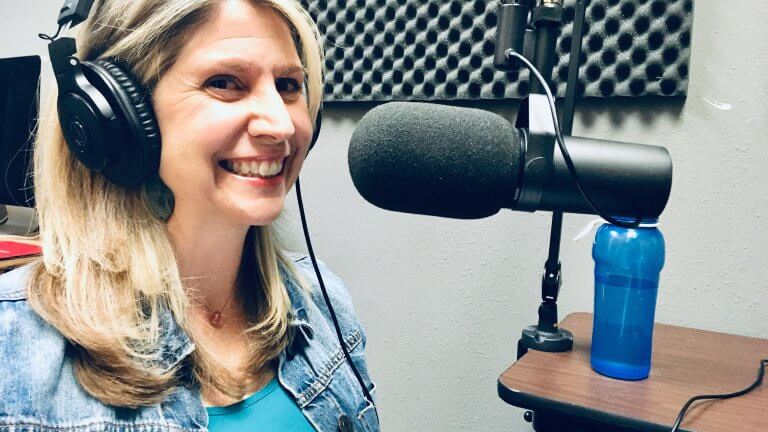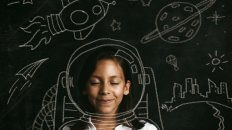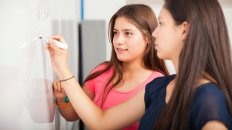We’re gonna be talking about strategies for self care because you are amazing and we don’t want you to burn out.
Share stories about surviving those first few days, weeks and months of teaching which will hopefully make you laugh and think and not take yourself too seriously.
We’re gonna touch on way to build meaningful relationships with you staff, parents and students because those relationship are the foundation of your teaching. Were gonna talk about behaviour, evidence based practices, transition planning and so much more.
Along the way we’re gonna have some really great guests for you, experts in their field, other specialists. They’re gonna share their experiences and their journey through this amazing world we call life skills.
Audio Transcript:
Download the full audio transcript
Hey, everyone. You’re listening to LifeSkills Radio, the podcast series for all things life skills. I’m your host, Jennifer Russell and I am an education specialist here at Region 13 and we’re so excited to be embarking on this audio journey with y’all. So when we think about life skills, let’s just think about all the things that we do in any given day. Life skills are the things that we need to know to make it out there in the world. So you’re thinking about your daily living skills, whether its functional academics or adaptive skills, feeding, dressing, community-based skills, all the things that we need to become an independent and productive member of our community.
We got a really good series for you here. We’re going to be talking about strategies for self-care because you are amazing and we don’t want you to burn out. We’re going to share stories about surviving those first few days, weeks and months of teaching, which will hopefully make you laugh and think and not take yourself too seriously. We’re going to touch on ways to build meaningful relationships with parents and students because those relationships are the foundation of your teaching. And we’re going to talk about behavior. We’re going to talk about evidence-based practices, transition planning, and hopefully more along the way. We’re going to have some really great guests for you, experts in their field, other specialists, they’re going to share their experiences and their journey through this amazing world we call life skills.
A little bit about me, I actually started my teaching career in New York City. I taught in self-contained and inclusion classrooms in underserved communities in East New York, Brooklyn and in East Harlem. And if you’ve never heard of east New York, Brooklyn just watch the first 15 minutes of Goodfellas, the real-life mobster, Henry Hill was born and raised there. It was rough, amazing kids with tons of barriers for them and I was really ill-equipped because see, I didn’t go directly from an undergrad education program into the classroom. I had moved from Texas to New York 10 years earlier to pursue a career in acting. I did some off-off-Broadway shows and a few commercials and voiceovers, but basically, I just became a very good food server. And I hit a wall.
I reached a point where I knew that I had to do something every day that had purpose and would be impactful. I wanted to work with kids with the most significant disabilities and I knew kids got me and I got them and I came from a family of teachers. So I applied for the New York City Teaching Fellows Program and I was accepted. After one month of student teaching, that’s one month at a high school in Washington Heights, I was hired as an elementary special ed teacher in a self-contained classroom with no paraprofessional in east New York. I went to grad school at night and breaks and I cried every day for the first three months. Seriously, I cried in front of everyone. No one was safe. I cried in front of students. I cried in front of parents, in front of other teachers. I cried in front of the principal. Teachers would see me coming down the hall with the lip quiver and they would just turn the other way and I totally don’t blame them.
We were all just trying to survive because although I truly believe teaching is the greatest and most important job in the world, it’s really also the hardest and it takes time to get good at it. And while you’re working hard to get good at it, you’ve got these young humans with lots of barriers that are looking to you to help them navigate their world. So it’s rough.
One of my favorite moments in the classroom that first year was when I was working with this young boy name Andre. Andre had an intellectual disability and emotional disturbance. He got in fights, he flipped desks and he never did any work ever. And being new and ill-equipped, I had no game. Eventually, after months of trying different strategies and failing, I just sat down next to him. I probably said all the wrong things, but I was really interested in what he was thinking and feeling. I said, “Andre help me understand why you don’t want to do any work. I want you to know that feeling of trying something and being successful. Don’t you want to know what that feels like?” He wasn’t looking at me, but he said with great assurance, “No.” I sat for a minute and then I said, “Well, what do you want to do?” And without missing a beat, he said, “I just want to sit on my bed and eat pancakes.”
I was completely stumped because that sounded amazing and I told him that I felt like I related to Andre Moore in that moment then I had related to any other student or colleague since I started teaching that year. It was that feeling of total exhaustion of defeat, of not knowing what to do. And when you don’t know what to do and are so tired of not knowing what to do, sitting on your bed eating pancakes sounds like a pretty great way to pass the time. I mean, why not?
My teammate, Darcy always likes to share this quote with new teachers. It says, “Being a teacher is easy. It’s like riding a bike, except the bike is on fire. You’re on fire. Everything is on fire. Teaching is so hard.” And being a life skills or PPCD teacher is the hardest, I think. You’re working with the students who are the most vulnerable, who have the most challenges, who have the greatest needs, and it can feel really impossible some days. Many times you’re the only one on your campus or in your district who does what you do. So it can also feel incredibly isolating. And that brings me to why we’re doing this podcast series. We want you to know first and foremost that you’re not alone. You’re valued. And the work you do is so important.
In a single day or I mean heck, even before breakfast is finished, the work of a life skills teacher can be inspiring, challenging, hilarious, exhausting, exhilarating, and in some rare instances, terrifying. So big picture, our mission is to connect with you. And after every podcast, our goal is for you to have new perspectives and new strategies that you can take into your classroom so that you can feel and be successful in your teaching practice and not have to sit on your bed and eat pancakes, although that still sounds pretty amazing.
And we want to hear from you if there’s something you want to know or something you want to say, you can shoot me an email at jennifer.russell@esc13.txed.net. Thanks so much for listening.
Checkout the rest of the lifeskills series
Jennifer Russell is an education specialist for the Early Childhood Special Education team here at the Education Service Center Region 13.









Add comment